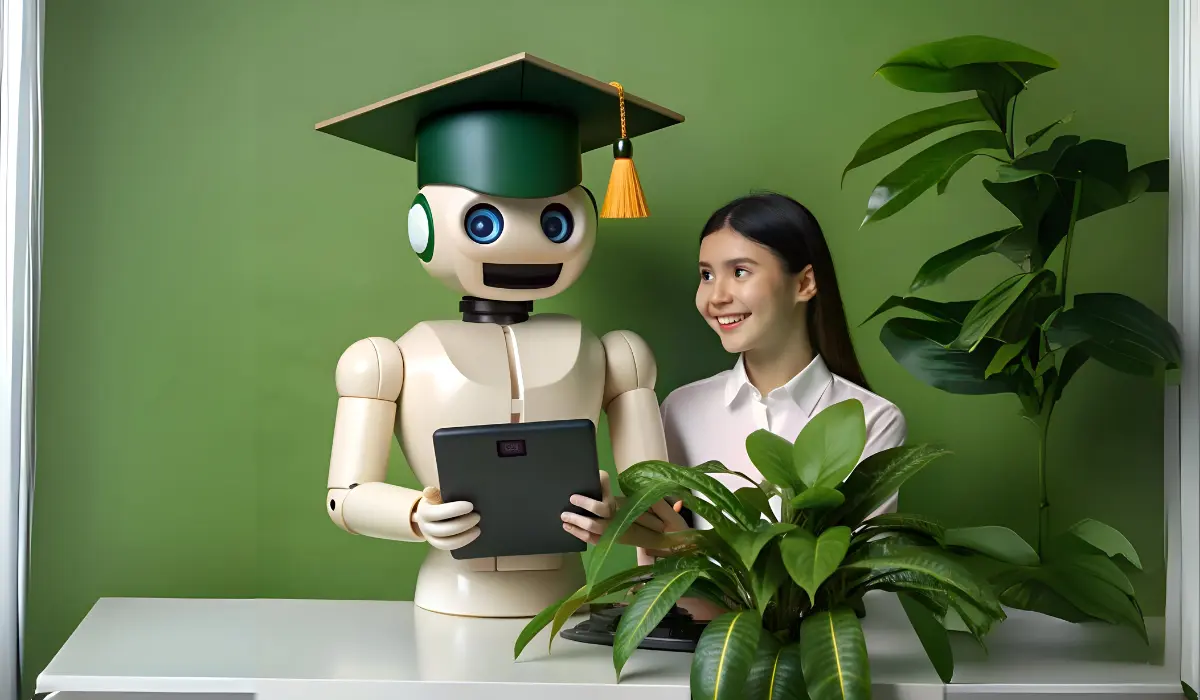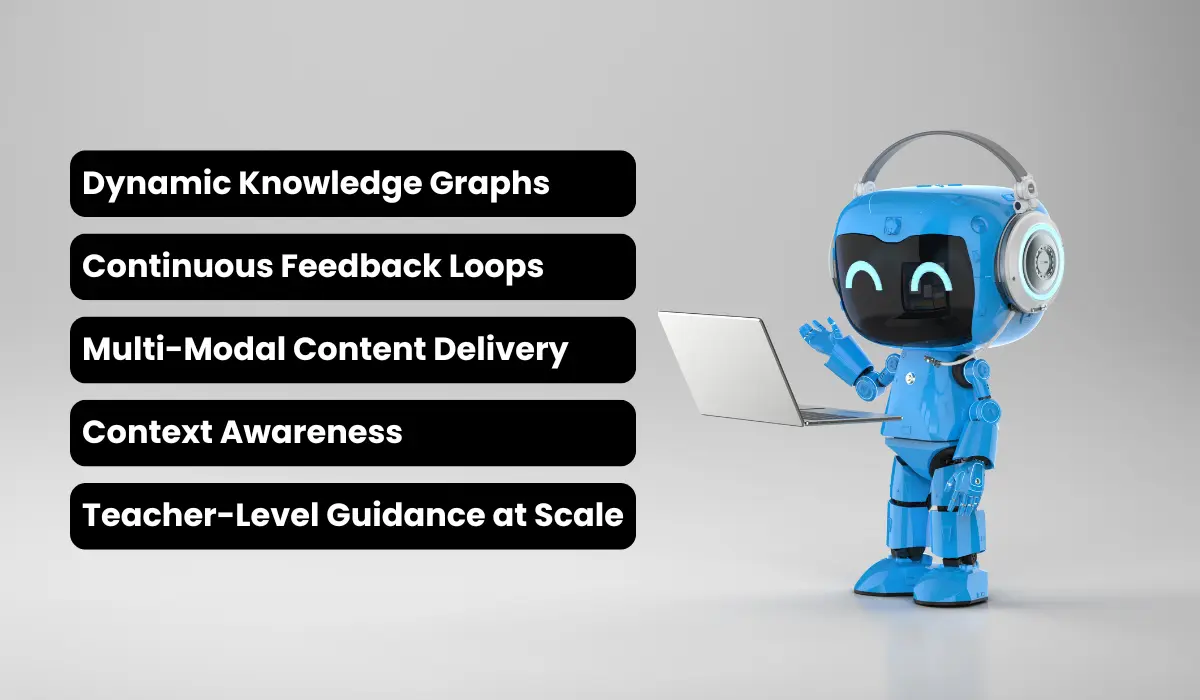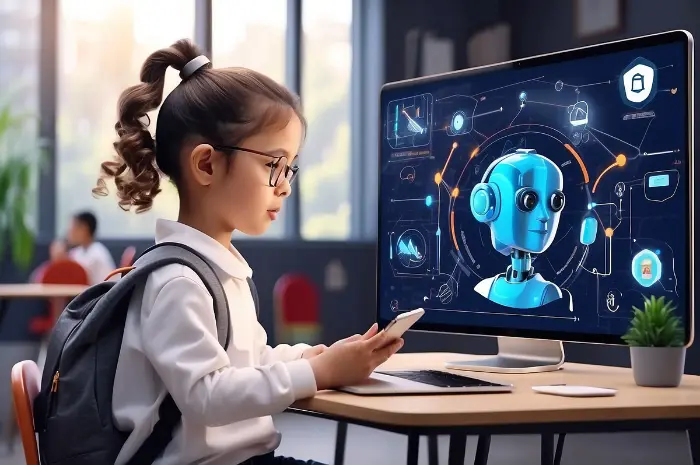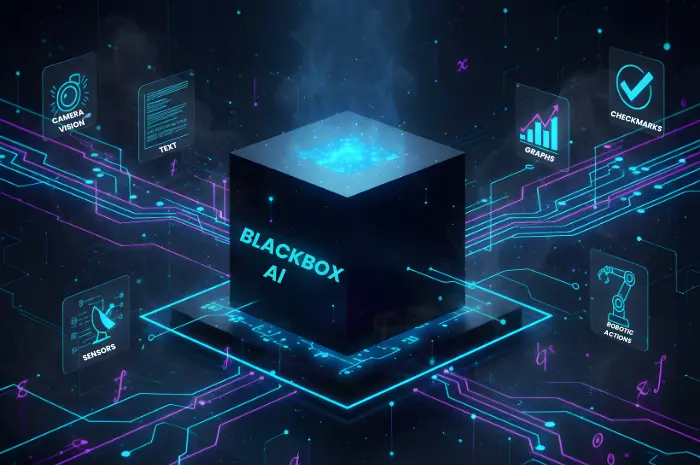While AI agents are now common in customer support, automation, and content generation, creating education agents is an entirely different challenge. These are not tools built for quick transactions; they are long-term learning companions that grow with students, adapting to their evolving needs over time. Their job is not to simply provide answers but to cultivate understanding, curiosity, and confidence.
Why Personalized Learning AI Agents Are Different from Generic AI Tools

Most AI agents today are built to prioritize speed, efficiency, or simply getting tasks done. But in education, the real goal is much deeper: helping learners truly understand, stay engaged, and feel supported throughout the journey. But what makes AI in education different from other AI agents?
1. Dynamic, Evolving Learner Models
Instead of relying on static profiles or a short history of interactions, these agents continuously adapt and grow alongside each learner. They track and update in real time, capturing things like:
- Knowledge mastery: What the student has learned, where they’re struggling, and where gaps might appear next.
- Learning patterns: How engaged they are, how persistent they remain, and how quickly they respond.
- Personal preferences: Whether they learn best with visuals, stories, interactive exercises, or hands-on practice.
With every interaction, the agent learns more, making the experience increasingly personal, almost like a learning companion that understands you as uniquely as a fingerprint.
2. Built on Learning Science, Not Just Algorithms
Generic AI agents are designed for efficiency. By contrast, personalized learning agents are deeply pedagogy-driven. They incorporate decades of research in cognitive science, instructional design, and psychology, using techniques like:
- Spaced repetition to improve long-term memory retention.
- Mastery-based progression to ensure students fully understand concepts before moving on.
- Constructivist approaches encourage exploration and critical thinking rather than rote memorization.
This blend of AI and educational theory makes these agents feel less like software and more like a supportive teacher who knows exactly what you need next.
3. Emotional Awareness and Motivation Support
Most AI tools don’t think about emotions. But in education, how a student feels matters just as much as what they know. Advanced AI learning agents use something called affective computing, the ability to notice and respond to emotional signals. This means they can:
- Pick up on confusion or frustration through voice, body language, or response patterns.
- Step in with encouragement, humor, or a different teaching style to ease stress.
- Adjust the pace and content so students stay motivated and engaged.
With this emotional intelligence, learners feel understood and supported, making the whole experience more effective and enjoyable.
4. Proactive, Personalized Learning Pathways
Instead of simply reacting to inputs, modern AI agents map out the entire learning journey. They:
- Build lesson plans around each student’s strengths and needs.
- Bring back reviews at just the right time to prevent forgetting.
- Add challenges that push skills forward without overwhelming the learner.
Think of them as digital curriculum designers, creating unique roadmaps for every student so no two learning paths ever look the same.
5. Ethics, Privacy, and Trust at the Core
Education deals with highly sensitive personal data, especially when agents track emotions, cognitive development, and progress. That’s why ethical design is non-negotiable:
- Techniques like federated learning ensure personalization without compromising privacy.
- Bias detection prevents unfair treatment of students based on background or ability.
- Explainable AI allows teachers and parents to understand why an agent recommends certain lessons or strategies.
Here, transparency and trust matter as much as innovation.
Key Features That Make These Agents Powerful

- Dynamic Knowledge Graphs: Mapping a learner’s understanding of concepts and relationships between topics.
- Continuous Feedback Loops: Using every interaction to refine personalization.
- Multi-Modal Content Delivery: Offering lessons through videos, simulations, games, or adaptive quizzes.
- Context Awareness: Understanding when to push a learner forward or when to slow down.
- Teacher-Level Guidance at Scale: Making one-on-one mentorship accessible to millions of learners simultaneously.
Also Read: Top 5 AI Agents That Cut Your Customer Support Efforts by Half
Designing Intelligent Agents: Key Components

Time to look under the hood and explore what powers these agents:
Learner Modeling & Profiling
The agent builds a dynamic profile that includes:
- Mastery levels via knowledge tracing models (e.g., Bayesian Knowledge Tracing, Deep Knowledge Tracing).
- Learning behaviors (time spent, retry patterns, response times).
- Preferences and interests (detected via choices, topic selections, even eye-tracking or click patterns).
Content Recommendation & Sequencing
Next, agents decide what comes next. Advanced recommendation engines may use:
- Intelligent sequencing: ordering content to balance challenge and support.
- Spacing & interleaving: to improve retention.
- Multimodal options: text, video, simulations, quizzes.
Adaptive Scaffolding & Real-Time Feedback
As students work, agents analyze inputs, whether correct or incorrect, and respond with:
- Hinting strategies.
- Step-by-step walkthroughs.
- Motivation and emotional support (e.g., ‘You’re on the right track!’).
Emotional & Engagement Sensing
Modern agents tap into emotional signals:
- Facial expression analysis or speech patterns detect confusion, frustration, or boredom.
- Agents respond with empathy, offering a break, switching modalities, or a lightening tone.
Also Read: How AI Agents Are Quietly Transforming Business Analytics
Technical Challenges & Ethical Considerations

Data Privacy & Security
Student learning data is sensitive. Agent design must comply with privacy laws (e.g., GDPR, local regulations), using anonymization, encryption, and transparent data policies.
Equity & Bias
Models must avoid embedding biased assumptions. Agents should ensure fair access to engaging content for all students, no matter their background.
Human-Centered Integration
AI agents should augment, not replace, teachers. Their purpose is to ease teachers’ workload, not replace the human connection. Educators need intuitive dashboards and control over agent interactions.
Explainability & Trust
Transparent reasoning: for example, “I suggested this because you have shown strong visual learning preferences”, builds trust. Educators and students should understand agent decisions.
Real-World Examples of AI Agents in Personalized Learning
1. Jill Watson- Georgia Tech’s Virtual Teaching Assistant
An AI-powered teaching assistant called Jill Watson helps students in online computer science courses by answering routine questions- things like “When are assignments due?” or “What does this grading rubric mean?” Students were not aware it was a bot at first, and its effortless efficiency has allowed human TAs to focus on more meaningful, complex interactions.
2. Khanmigo by Khan Academy
Khanmigo, Khan Academy’s AI tutor, delivers personalized guidance, instant feedback, and insights into student performance. It adapts to each learner’s pace and helps educators monitor class-wide progress.
3. Squirrel AI (China)
This adaptive learning platform breaks curricula into thousands of fine-grained “knowledge points,” builds personalized learning paths via diagnostic tests, and then adapts lessons in real time based on mastery. Squirrel AI has opened thousands of learning centers and reportedly helped students outperform peers taught by human teachers.
4. Carnegie Learning’s Cognitive Tutor (and MATHia)
Carnegie Learning developed an AI-powered tutoring system for math that provides step-by-step support- analysing student responses, identifying reasoning gaps, and tailoring prompts or simpler problems accordingly. Some implementations have produced up to 30% improvement in math scores.
5. Mindspark in India
Mindspark adapts math content dynamically, starts learners at their actual level rather than grade level, and provides real-time feedback in local languages. Students using it achieved 2–2.5 times more progress than their peers in traditional classrooms.
6. AutoTutor- Conversational AI for Physics & Literacy
Developed at the University of Memphis, AutoTutor engages learners through natural conversation- via voice or text, and uses advanced language processing to adapt to cognitive and emotional states. It has demonstrated notably large learning gains, with effect sizes averaging 0.8 (roughly equivalent to a full letter grade).
7. Audemy- Audio-Based AI for Visually Impaired Learners
Audemy, a new platform, customizes audio-based learning content for students who are blind or visually impaired. It adapts pacing, accuracy levels, and reinforcement strategies, with over 2,000 users and contributions from accessibility educators, demonstrating how personalization can intersect with inclusivity.
8. AI in Writing: Grammarly’s AI Agents
Grammarly’s updated Docs platform now includes multiple AI agents like AI Grader, Citation Finder, Expert Review, Plagiarism Checker, and AI Detector to provide students with contextual feedback on writing, support ethical practice, and bolster AI literacy.
The Future: AI as a Mentor, Not a Machine
Building AI agents for personalized learning is not just a technical project; it is a fusion of artificial intelligence, human empathy, and learning science. These agents are designed to inspire curiosity, support diverse learning needs, and bring equity to education on a global scale.
In a world overflowing with generic AI applications, these specialized agents stand out because they are not simply automating tasks; they are shaping futures. They are here to extend the reach of educators, making personalized guidance accessible to every learner, everywhere.
Reimagining Education, One Agent at a Time
Developing AI agents for personalized learning means blending cutting-edge technology with deep human empathy. When done right, these agents become more than smart software; they become patient tutors, sensitive guides, and constant supports. Together with educators, they empower every learner to journey at their own pace, in their own way, toward lifelong discovery.
The classroom of tomorrow is not one-size-fits-all; it is a kaleidoscope of learners, each guided by AI that knows them, cares for them, and helps them shine.






